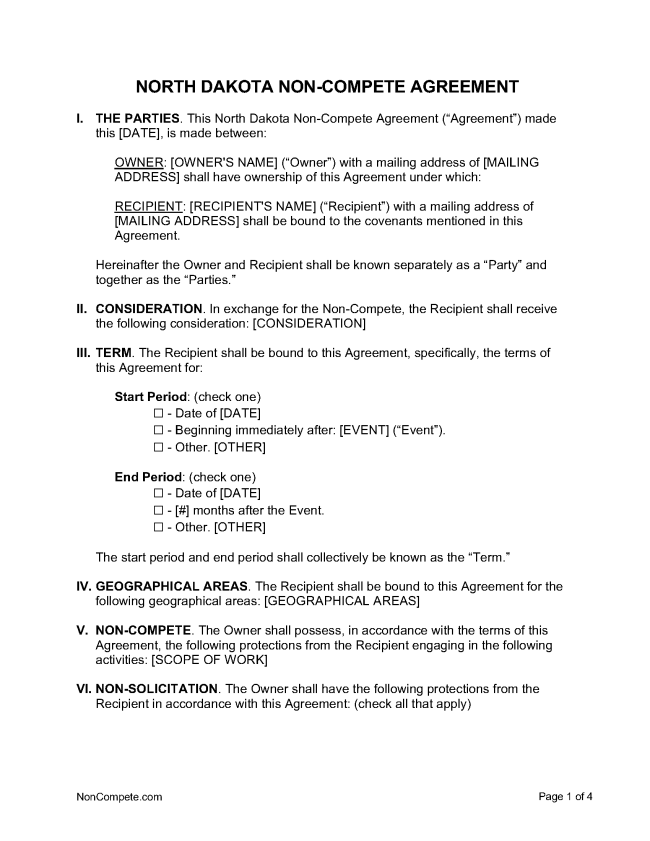A North Dakota non-compete agreement is a contractual provision that limits the ability of certain people to pursue a line of business. Non-compete agreements are heavily restricted in North Dakota and cannot be included in employment contracts. There is also uncertainty surrounding how portions of the law should be interpreted.
Table of Contents |
Are Non-Competes Enforceable in North Dakota?
Generally, no. Non-competes agreements are not enforceable in the post-employment context. N.D. Cent. Code Ann. § 9-08-06.
However, non-compete agreements covering a reasonable territory and a reasonable amount of time may be permissible in the context of:
- The sale of the good will of a business (N.D. Cent. Code Ann. § 9-08-06(1)), or
- The dissolution of a partnership, limited liability company, or corporation (N.D. Cent. Code Ann. § 9-08-06(2)).
Trade Secrets
Although non-compete agreements involving employees are not prohibited, employers are protected against misappropriation of trade secrets through North Dakota’s Trade Secrets Act. Employers may protect their trade secrets through lawsuits seeking an order to prevent their disclosure (N.D. Cent. Code Ann. § 47-25.1-02) or to recover money damages (N.D. Cent. Code Ann. § 47-25.1-03).
Good Will
The good will of a business is the expectation of continued public patronage. N.D. Cent. Code Ann. § 47-07-10.
The sale of stock can qualify as the sale of good will to make a non-compete agreement enforceable but does not always. In Warner & Co. v. Solberg (2001), the North Dakota Supreme Court that a small amount of stock does not qualify.
Reasonableness
Until recently, North Dakota’s statute on non-compete agreements required that, when an agreement fell within a permissible exception, it be limited to a specified city or county. In 2019, the legislature changed the statute’s language to limit it to “reasonable” territory and time restrictions. N.D. Cent. Code Ann. § 9-08-06.
However, there have been no reported North Dakota court cases interpreting the new law, so it is unclear what “reasonable” means.
Prohibited Professions
Partnership, shareholder, and business operating agreements that restrict a lawyer’s right to practice are prohibited, except for agreements regarding retirement benefits. Rule 5.6(a), North Dakota Rules of Professional Conduct.
Case settlements cannot restrict an attorney’s right to practice in the future. Rule 5.6(b), North Dakota Rules of Professional Conduct.
Terminating an Employee
North Dakota’s non-compete statute does not mention the impact of terminating an employee on an agreement’s enforceability, and there are no cases addressing this question.
In the context of an injunction before a trial occurs, the party seeking to enforce the non-compete agreement has the burden of proof. (Pruco Securities Corp. v. Montgomery (2003)).
Continued Employment (consideration)
Because non-compete agreements are not permitted in the employment context, continued employment will never be adequate consideration.
Maximum Term
The sale-of-goodwill exception to North Dakota’s prohibition on non-competes states that the agreements may be valid for as long as the new buyer carries on a similar business in the area. N.D. Cent. Code Ann. § 9-08-06(1)).
It’s unclear if a lesser amount of time may be unenforceable for some other reason. In Herman v. Newman Signs, Inc. (1987), the North Dakota Supreme Court found that a geographic restriction in a sale-of-business non-compete agreement had to be modified but left the agreement’s 10-year limitation alone.
Blue Penciling
It is unclear whether North Dakota allows courts to modify non-compete agreements to make them enforceable. In Igoe v. Atlas Ready-Mix, Inc. (1965), the North Dakota Supreme Court ordered that a non-compete agreement be rewritten to limit it to a single state and county. But it is unclear whether a court would act outside the context of an unreasonable geographical provision or how it would respond to the new law.
